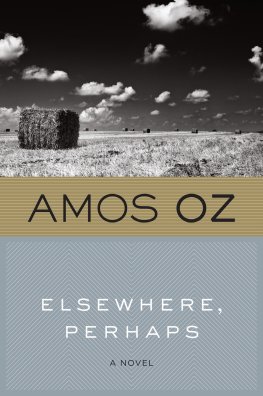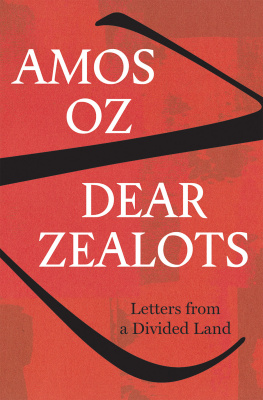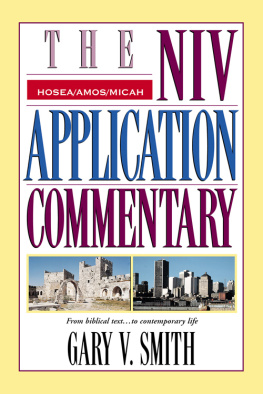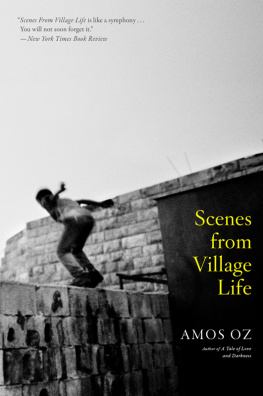Amos Oz - Elsewhere, Perhaps
Here you can read online Amos Oz - Elsewhere, Perhaps full text of the book (entire story) in english for free. Download pdf and epub, get meaning, cover and reviews about this ebook. year: 1985, publisher: Mariner Books, genre: Prose. Description of the work, (preface) as well as reviews are available. Best literature library LitArk.com created for fans of good reading and offers a wide selection of genres:
Romance novel
Science fiction
Adventure
Detective
Science
History
Home and family
Prose
Art
Politics
Computer
Non-fiction
Religion
Business
Children
Humor
Choose a favorite category and find really read worthwhile books. Enjoy immersion in the world of imagination, feel the emotions of the characters or learn something new for yourself, make an fascinating discovery.
Elsewhere, Perhaps: summary, description and annotation
We offer to read an annotation, description, summary or preface (depends on what the author of the book "Elsewhere, Perhaps" wrote himself). If you haven't found the necessary information about the book — write in the comments, we will try to find it.
Elsewhere, Perhaps — read online for free the complete book (whole text) full work
Below is the text of the book, divided by pages. System saving the place of the last page read, allows you to conveniently read the book "Elsewhere, Perhaps" online for free, without having to search again every time where you left off. Put a bookmark, and you can go to the page where you finished reading at any time.
Font size:
Interval:
Bookmark:
Amos Oz
Elsewhere, Perhaps
In Memory of My Mother
Do not imagine that Metsudat Ram is a reflection in miniature. It merely tries to reflect a faraway kingdom by a sea, perhaps elsewhere.
PART ONE. Over Against the Fishermen
1. A CHARMING, WELL-ORGANIZED VILLAGE
You see before you the kibbutz of Metsudat Ram:
Its buildings are laid out in strict symmetry at one end of the green valley. The tangled foliage of the trees does not break up the settlement's severe lines, but merely softens them, and adds a dimension of weightiness.
The buildings are whitewashed, and most of them are topped with bright red roofs. This color scheme contrasts sharply with that of the mountain range, which completely blocks the view to the east, and at the foot of which the kibbutz lies spread. The mountains are bare and rocky, cut by zigzagging ravines. With the sun's progress their own shadows spill gradually down these folds, as if the mountains are trying to relieve their desolation with this melancholy shadow play.
Along the lower terraces on the slope stretches the border between our land and that of her enemies.
This border, prominently marked on the maps with a thick green line, is not visible to the observer, since it does not correspond to the natural boundary between the lush green valley and the bleak, bare mountains. The soil of Israel overflows the limits of the valley and spreads up the lower slopes toward the barren heights. So the eye and the mind or, more precisely, geology and politics come to be at odds with one another. The kibbutz itself stands some two miles from the international frontier. We cannot define the distance more precisely without entering into the bloodstained controversy over the exact location of this line.
The landscape, then, is rich in contrasts, contrasts between appearances and reality and also inner contrasts within the appearances. These can be described only by the term "contradiction." There is a kind of enmity between the valley, with its neat, geometrical patchwork of fields and the savage bleakness of the mountains. Even the symmetrical architecture of Kibbutz Metsudat Ram is no more than a negation of the grim natural chaos that looks down on it from above.
The contrast inherent in the landscape naturally plays a prominent part in the works of Metsudat Ram's own poet. Sometimes it takes the form of a genuine symbol, as we shall see if we look at the poems of Reuven Harish. For the time being, let us borrow the poet's favorite contrast and apply it to matters that Reuven Harish does not write about.
Consider, for example, the striking contrast between our village and the typical village, which arouses nostalgic feelings in the hearts of city dwellers. If you are accustomed to the sight of ancient villages, their roofs soaring on high in convoluted northern shapes; if in your mind you associate the word "village" with horse-drawn carts piled high with hay and with pitchforks stuck in their sides; if you yearn for crowded cottages huddling round the rain-swept spire of an old church; if you look for cheerful peasants with brightly colored clothes and broad-brimmed hats, picturesque dovecots, chickens busily scratching in a dung heap, packs of lean, vicious dogs; if you expect a village to have a forest round about and winding dirt paths and fenced fields and canals reflecting low clouds and muffled wayfarers heading for the shelter of an inn if this is your mental picture of a village, then our village is bound to startle you, and it is this which has compelled us to introduce the term "contradiction." Our village is built in a spirit of optimism.
The dwellings are absolutely identical, as is demanded by the ideological outlook of the kibbutz, an outlook that has no parallel in any village in the world. The well-known lines of Reuven Harish convey the essence of the idea:
In the face of a foul world bent on doom,
And the lascivious dance of death,
In the face of sordid frenzy,
In the face of drunken madness,
We will kindle a flame with our blood.
The houses, as we have said, are brightly painted. They are laid out at regular intervals. Their windows all face northwest, since the architects tried to adapt the building to the climate. Here there is no agglomeration of buildings clustering or ramifying haphazardly down the ages, nor blocks of dwellings enclosing secret courtyards, for the kibbutz does not have family homes. There is no question of separate quarters for different crafts; the poor are not relegated to the outskirts nor is the center reserved for the wealthy. The straight lines, the clean shapes, the neatly ruled concrete paths and rectangular lawns are the product of a vigorous view of the world. That was what we meant when we stated that our village was built in a spirit of optimism.
Anyone who draws the shallow inference that our village is stark and lacking in charm and beauty merely reveals his own prejudice. The object of the kibbutz is not to satisfy the sentimental expectations of town dwellers. Our village is not lacking in charm and beauty, but its beauty is vigorous and virile and its charm conveys a message. Yes, it does.
The road that joins our kibbutz to the main road is narrow and in bad repair, but it is straight as an arrow in flight. To reach us you must turn off the main road at a point indicated by a green and white signpost, skirt the potholes in the road, and climb a pleasant small hill not far from the kibbutz gates. (This is a green and cultivated hill, which is not to be seen as a finger of the mountains thrust violently into the heart of the valley and lopped off, since it has nothing in common with the menacing mountain heights.) Let us pause for a moment and engrave the striking colored picture-post card scene on our memories. From the top of the hill we can look down on the kibbutz. Even if the view does not inflame the heart, still it pleases the eye. The open iron gates, a sloping fence, and, nearby, a tractor shed. Agricultural implements scattered about in cheerful disorder. Buildings crowded with livestock chickens, cattle, and sheep constructed on the latest plan. Paved paths branch out in various directions, and avenues of bush cypresses trace the skeleton of the over-all shape. Farther on stands the dining hall, surrounded by well-kept flower beds. It is an outstanding modern building, whose size is relieved by its light lines. As you will discover, its interior does not belie its faade. It radiates a delicate, unpretentious elegance.
Beyond the dining hall, the settlement is divided into two separate blocks, the veterans' quarters on one side and the young people's on the other. The houses wallow in cool greenery, overshadowed by trees and surrounded by lush lawns pricked out with brightly colored flower beds. The soft sound of rustling pine needles is ever present. The tall granary to the south and the tall recreation hall to the north break the uniform lowness and add a dimension of height to the settlement. Perhaps they can compensate to some extent for the missing church spire that, whether you admit it or not, is an integral feature of your picture of the typical village.
To the east, at the farthest corner from your vantage point, is a collection of huts. This serves as a temporary home for training courses, work camps, and army units, anyone who comes to share our burden for a limited span of time. The huts bestow a pioneering character on the whole picture, the air of a border settlement ready to turn a resolute face to impending disasters. So does the sloping fence that surrounds the kibbutz on all sides. Let us pause here for a moment to evoke your admiration.
Now let us look toward the fields of crops all round the kibbutz. A heart-warming sight. Fields of bright green fodder, dark orchards, cornfields echoing the sunshine with a blaze of gold, banana plantations with a tropical air of overpowering vitality, vineyards spreading right up to the rocky heights, the vines not sprawling untidily but neatly arranged on trellises. The vineyard, delightfully, makes a slight inroad into the mountain terrain, which is indicated by the gentle curve of the ends of the rows. We shall refrain from reciting yet another of the poems of Reuven Harish, but we cannot conceal our modest pride at the marked contrast between the cultivated plain and the grim heights, between the blooming valley and the menacing mountain range, between the confident optimism below and the unruly glowering presence above.
Font size:
Interval:
Bookmark:
Similar books «Elsewhere, Perhaps»
Look at similar books to Elsewhere, Perhaps. We have selected literature similar in name and meaning in the hope of providing readers with more options to find new, interesting, not yet read works.
Discussion, reviews of the book Elsewhere, Perhaps and just readers' own opinions. Leave your comments, write what you think about the work, its meaning or the main characters. Specify what exactly you liked and what you didn't like, and why you think so.
















